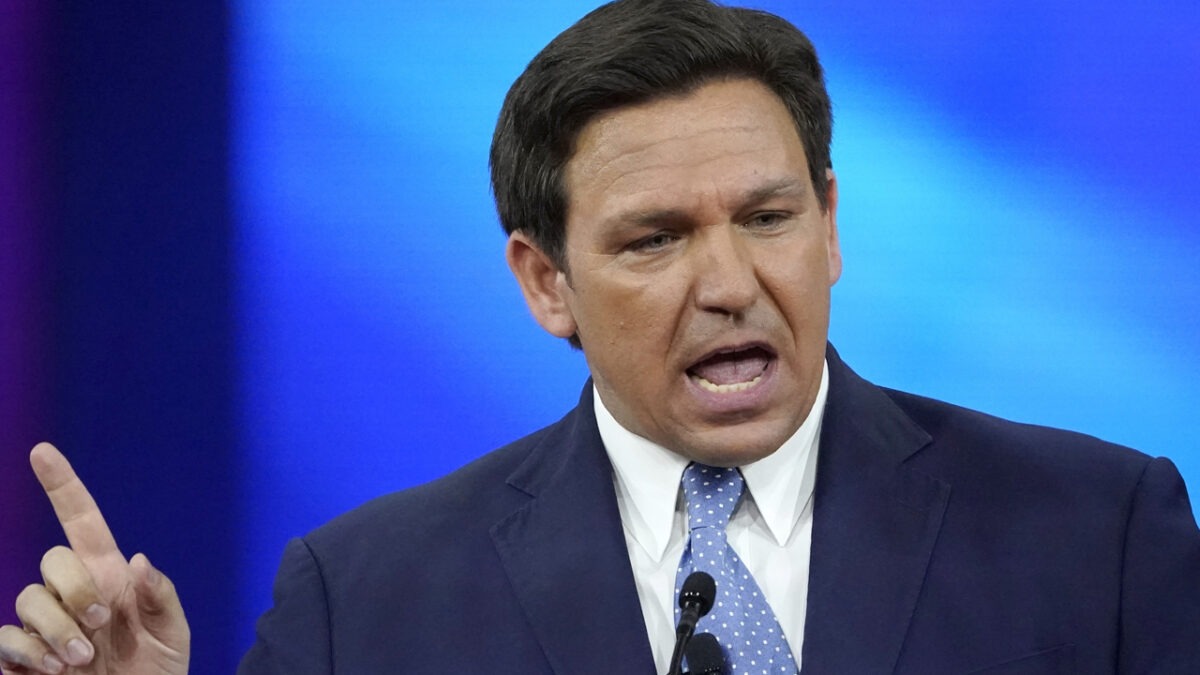Governor DeSantis Calls Florida GOP Voters With Misleading Warnings About Abortion, Marijuana Amendments

AP Photo/John Raoux, File
I got a phone call from Florida Gov. Ron DeSantis tonight.
At 6:44 pm ET, my cell phone rang with a call identified as “POLITICAL CALL” from an 850 area code, which is Tallahassee, our state capital. Being a curious political junkie — and expecting the call to be a poll — I answered.
It wasn’t a poll. The person introducing the call said she was calling with the Republican Party of Florida.
“We are currently hosting a live telephone town hall with Governor Ron DeSantis to discuss Florida’s dangerous constitutional amendments on the ballot November 5th,” she said. “Stay on the line and you will connect momentarily to hear from Governor DeSantis or press 1 on your phone to join right now. Please note that this call may be recorded.”
I’m a registered Republican who always votes, so I have been inundated with campaign mail and text messages the past few months, but I’ve been a very outspoken critic of the governor, so the fact that no one at RPOF figured out how to not include me on their call list was an amusing surprise.
I quickly grabbed my digital recorder and hit record. After all, RPOF already told me “this call may be recorded,” and if they have the right to record it, so do I.
Here is that audio recording:
The call was clearly intended for Republican voters, as DeSantis emphasized that RPOF was urging listeners to vote no on Amendment 3 and 4, the amendments on the Florida ballot this year dealing with recreational marijuana legalization and abortion, respectively.
It is noteworthy not just that DeSantis has personally been very outspoken in opposition to these ballot amendments, but how his position diverges from former President Donald Trump, who spent weeks dodging questions about how he intended to vote on Amendment 4.
Trump has frequently criticized the 6-week ban DeSantis signed into law, and in late August seemed to indicate support for Amendment 4, telling a reporter that “six weeks is a mistake” and “I do want more than six weeks,” but later that day a campaign adviser walked that back and said Trump had yet to decide. He finally clarified on Fox News that he would be voting no, but the ex-president is notably far less strident on the issue than DeSantis, perhaps due to the way the issue is viewed as an obstacle to winning over women voters. Democrats, both nationally and in Florida, are certainly hoping to capitalize on that.
DeSantis has taken a very heavy hand to thwart the passage of both Amendment 3 and 4, directing the expenditure of millions of taxpayer dollars on state agencies running ad campaigns opposing them, and deploying multiple state officials and employees as well. Critics of the governor’s tactics have pointed to Fla. Stat. Section 104.31, which bans any officer or employee of the state or any county or municipality in Florida from using “his or her official authority or influence for the purpose of interfering with an election” or “coercing or influencing another person’s vote or affecting the result thereof.”
He also had attorneys in his office direct attorneys at the Florida Department of Health to send letters to television stations threatening them with criminal prosecutions for running ads supporting Amendment 4, a maneuver that was shot down on free speech grounds by a federal judge in a scathing opinion that contained the memorable line, “To keep it simple for the State of Florida: it’s the First Amendment, stupid.” FDOH general counsel John Wilson resigned over the letters and stated in a sworn affidavit he did so to avoid having to send out any more letters threatening media outlets.
Shepherding the call was James Uthmeier, DeSantis’ chief of staff, who introduced himself on the call as “This is James. I’m the governor’s chief of staff. The email address is not hard to remember. It’s James at Ron DeSantis dot com.” Several times throughout the call, he told listeners they could ask a question by hitting *3 and asked listeners to donate by hitting *1.
One particularly misleading argument that DeSantis used multiple times on the call was the claim that Amendment 4 would remove the requirement for parental consent for minors to have abortions. Around the 22:00 mark, the governor replied to a caller’s question about ads he’d seen saying Amendment 4 would eliminate parental consent. DeSantis’ reply:
It’s a bait and switch that the people that are proposing Amendment 4 are eliminating parental consent, but they know that’s very unpopular. And so they’re saying that they’re preserving parental notification, but that is not the same as parental consent.
And so you can have a postcard sent to you saying, hey, you know, your, your, your kid’s going to have an abortion, you know, tonight at 7:00, and, uh, there’s nothing you can do to prevent that. And so it is taking away the right of parents to consent. It’s a bait and switch. Notification is not consent. Our laws on the books are consent across the board for minors with medical — this would change that.
The real “bait and switch” is the games DeSantis is playing with the actual text of Amendment 4, the Florida Constitution, and existing statutes — including pretending a law he himself signed doesn’t exist.
The text of Amendment 4 contains this exact language: “This amendment does not change the Legislature’s constitutional authority to require notification to a parent or guardian before a minor has an abortion.”
DeSantis and the ads from RPOF and other groups opposing Amendment 4 are claiming that this text about parental notification would invalidate parental consent. That’s “a deliberate effort to blur the line” and “manipulate and mislead Floridians,” wrote the Sun Sentinel editorial board in an op-ed published Tuesday.
Parental notification was codified in the state statutes after a constitutional amendment was passed in 2004 that specifically granted the state legislature the right to create it, and as noted above, Amendment 4 expressly states it “does not change” that authority.
As far as parental consent goes, the Florida Constitution is silent on the issue, as is Amendment 4. But DeSantis himself signed a bill in 2020 requiring parental consent for abortions, and the law has an exception for a minor to get an abortion without consent from a parent or guardian, in which she petitions the court and asks the judge to grant her permission. The governor is right when he said that a school can’t give a child a Tylenol without parental permission, but he’s engaging in baseless scaremongering to suggest minors will be able to get abortions without their parents under this amendment.
Passing Amendment 4 will not change “the fact that parents have nearly unlimited rights over the health care their children receive,” the Sun Sentinel editorial board wrote, elaborating on how Florida’s notification requirement and the political climate of this state would combine to uphold the existing structure:
Once they are notified, it would be easy for a parent to block access to abortion care. And ducking parental notification would require a judge’s permission — which would be extremely difficult for a teenager to secure, especially in a way that would meet the documentation clinics are forced to produce, [State Rep. Anna] Eskamani says. She speaks from experience: When she worked for Planned Parenthood of Central Florida, she observed minors seeking abortions. She also agrees that most teenagers would want and need their parents’ support during a difficult time. A national survey of more than 1,500 minors who had abortions found that more than 61% of all minors told at least one parent before seeking abortion care. That number rose to more than 90% for minors under the age of 15.
A state Legislature like Florida’s that has been gerrymandered into supermajority conservatism will never pass a law eliminating the current requirement for parental consent.
Finally, if Amendment 4 passes and is subsequently used to argue that the state’s parental consent law should be tossed, that legal case will ultimately be heard by Florida’s hard-right Supreme Court. Any legal challenge to parental consent would almost certainly fail before the court, whose members include three justices who argued to keep Amendment 4 off the ballot and who were hand-picked by an anti-abortion governor well aware of their anti-abortion views.
DeSantis also complained that Amendment 4 did not define “health care provider” and argued that was “incredibly extreme” and would allow “non-physicians” to set up “bootleg abortion clinics.” Again, this is a red herring.
The way the phrase is used in Amendment 4 is to enshrine the right to an abortion “when necessary to protect the patient’s health, as determined by the patient’s healthcare provider.” If a pregnant woman has been diagnosed with cancer — like Caroline, a Tampa woman featured in a pro-Amendment 4 ad — her oncologist could make that determination, but not be the doctor to perform the abortion itself.
The phrase “health care provider” is used over 500 times in existing Florida Statutes, and abortion itself is heavily regulated. This isn’t actually anything that is unclear in Florida law and isn’t opening any doors for random people to operate “bootleg abortion clinics.” A manicurist in a strip mall, a tattoo artist, or even a dentist are not going to legally be able to provide an abortion in Florida. It’s either performed through a medical procedure or via medicines available only with a prescription, which again, is all regulated under existing state laws.
The reason Amendment 4 was able to get sufficient petition signatures to get on the ballot and has a good chance of passing is that Floridians, even those who identify as pro-life conservatives, have strong misgivings about the extreme restrictions imposed by Florida’s six-week ban.
This is an opinion piece. The views expressed in this article are those of just the author.






